The Checker Maven
The World's Most Widely Read Checkers and Draughts Publication
Bob Newell, Editor-in-Chief
Published every Saturday morning in Honolulu, Hawai`i
Noticing missing images? An explanation is here.
Uncle Ben's Porch: Girl Trouble

Tommy Wagner had girl trouble, and as a ninth grader, he had never expected any such thing.

Tommy
It all started when he had a match-up against rising star Letitia Wong (see previous Checker Maven story). Tommy won his game, but he was especially impressed with Letitia's sportsmanship and gentle manner. It had given him a funny feeling that was hard to describe.

Letitia Wong
So a week later, even though he knew maybe he shouldn't be doing it, he gave Letitia a call. Despite his nervousness, Letitia had been very receptive and friendly and even suggested that they go to a movie together on the following Sunday afternoon.
Tommy didn't know how to refuse--- he wasn't even sure that he wanted to refuse--- and that's when the trouble began.
The problem was this: Tommy had been keeping company with another girl, Tina, for quite some little while. They had gone to grade school together and were close friends.

Tina
It was just Tommy's luck, or maybe it was fate, that Tina and her older sister went to the very same movie at the very same theater on the very same Sunday. Naturally, she saw Tommy and Letitia together. Tina immediately burst into tears, and after the movie both she and her sister confronted Tommy and Letitia.
It was not a pretty scene and Letitia, mortally embarrassed, was quite angry with Tommy--- although maybe not as angry as Tina was. In the course of not even five minutes, Tommy went from two girlfriends to none, with Tina and her sister stomping off angrily and Letitia telling Tommy pointedly that she'd take the bus home by herself.

Tommy was in a down mood all week, and it persisted into his Saturday morning checker lesson with Uncle Ben, a retired checker professional and Tommy's long-time mentor.
Tommy dragged up the steps to Uncle Ben's front porch and plopped into a chair with only the barest of greetings.
"Something's wrong, isn't it?" Uncle Ben asked. He could have chided Tommy for his lack of manners, but Uncle Ben was too kindly for that.
"No, sir," Tommy muttered. "Everything's fine."
"I don't think so," Uncle Ben said firmly. "Now, you don't have to tell me about it, but please don't deny it. After all these years I think I know you pretty well."

Tommy sat silently while Uncle Ben, wishing to put Tommy at ease, poured out tall glasses of his deservedly famous lemonade.
Tommy couldn't help but relax, if only a little, after his first sip. "Thank you, Uncle Ben," he said, and then, at all once, launched into the story of his girl trouble.
It was Uncle Ben's turn to sit silently for a few moments. Then he said, "Well, Tommy, and who do you suppose is to blame for this situation?"
"If Letitia hadn't asked me to go to the movie with her ..."
"Just a minute! There are three things wrong with that. First, Letitia didn't know anything about Tina. Second, you didn't have to accept her invitation. And third, you're the one who called Letitia to begin with."
"Um ... yeah ... kind of looks like I brought this on myself, doesn't it?"
Uncle Ben didn't need to reply.
"But now, I don't know what to do about it!"
"What does someone do when they've hurt or offended someone else?"
"Er ... well ... they say 'sorry'?"
"Exactly. You've taken the first step by admitting responsibility. That's a big thing. But it's not enough by itself. Now you have to do something even harder. You have to face the people you've hurt and apologize. Do you think you can do that?"
"I don't know ... but I have to, don't I? So I guess ... well, I just have to. Right away."
"Very good, Tommy, the sooner the better. But not quite right away. You can do what you must this afternoon. I think it will go better if you do a little checker study first to clear your head and focus your thoughts."
Uncle Ben pointed to the checkerboard he had set up on a little porch table. "Today we're going to study something known as the back shot. Take a good look at this position. Push everything else out of your mind and focus. Then tell me how to solve it."
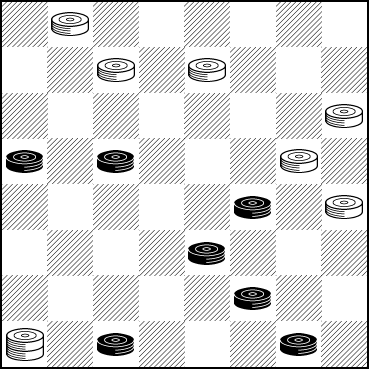
BLACK
Black to Play and Win
B:WK4,13,17,21,26,27,32:B1,3,6,10,14,19,20
Tommy took a deep breath, then another, and began to concentrate. After about five minutes, he said, "I'm ready, Uncle Ben."
Do you need a checker problem to clear your head and put you in a frame of mind for doing ... whatever you need to do? We certainly hope you don't have girl (or boy) trouble! Do give the position a good try and then click on Read More to see the solution, notes, and numerous additional examples of the theme.![]()
Logical Checkers Vol. 3: Two-Move Expert

Today we're delighted to announce the immediate availability of the third volume of Grandmaster Richard Pask's Logical Checkers series, subtitled Checkers for the Two-Move Expert. In this new book, which runs to close to 300 pages, Mr. Pask presents new material on endgames, landings, and a vast array of tactical themes, as well as a survey and analysis of two-move ballots (as a stepping-stone to eventual study of three-move ballots).
You can get the book from the Richard Pask page as linked in the right-hand column, or directly here. The book is of course completely free of charge thanks to the generosity of Mr. Pask.
As a bit of a teaser, here's a position found in the book. It's one of Mr. Pask's own devising which he calls Life's Not Fair.
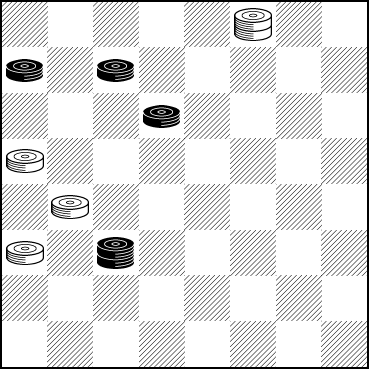
WHITE
White to Play and Win
W:WK3,13,17,21:B5,6,10,K22
To see the solution, download the book and go to Diagram 391 on page 92.
The Checker Maven thanks Mr. Pask for the continuing privilege of editing and presenting his work.![]()
One Last Gem

For the last several months our monthly Checker School columns have been featuring "gem" problems. Whether or not they were all truly "gems" is for you, our reader, to decide, but we have one last entry in the current series to present to you today. It's by S. J. Pickering and apparently first made its appearance in the old (and excellent) checker magazine Elam's Checker Board.
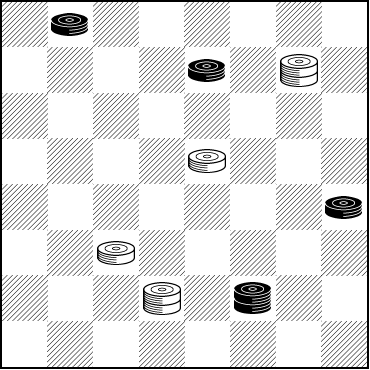
WHITE
White to Play and Win
W:WK8,15,22,K26:B1,7,20,K27
White has two kings to Black's one and has a centralized position. Should be easy, shouldn't it? But checkers is subtle and complex, and the win may not be so simple.
Does this one sparkle for you? Can you appreciate its facets? See if you can solve it and then let your mouse shine on Read More to see the solution and notes.![]()
A Trap With A Tale, Continued
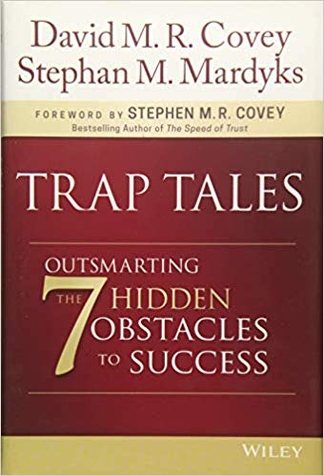
Trap Tales is a self-help book that purports to help you overcome seven traps that might derail your life. A Tale of Traps, perhaps, rather than A Trap With A Tale. We haven't read this book so we can't say much about it, but it's received high marks from readers and reviewers.
Are there seven traps to avoid in the game of checkers? Willie Ryan has already shown us dozens, and there are countless more. One book would never be enough to tell the tale of all of them.
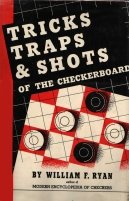
As we continue to move toward a conclusion of our Tricks Traps & Shots of the Checkerboard series, which has run for many years now, we have one more position to present from Willie's A Trap With A Tale section.
Here's the run-up, with brief commentary by your Editor, using KingsRow with the 10-piece endgame database.
| 1. | 11-16 | 24-19 |
| 2. | 8-11 | 22-18 |
| 3. | 16-20 | 25-22 |
| 4. | 9-13 | 29-25 |
| 5. | 11-15 | 18x11 |
| 6. | 7x16 | 22-18 |
Out of book, inferior, and might lose. 21-17 or 28-24 would have been fine.
| 7. | 20-24 | 27x11 |
| 8. | 10-15 | 19x10 |
| 9. | 6x29 | 28-24 |
| 10. | 29-25 | 32-27 |
| 11. | 1-6 | 24-19 |
Worse yet. 24-20 was better but White is definitely lost.
| 12. | 6-9 | ... |
Maintains a slight advantage but throws away the win. 25-29 was indicated, believe it or not.
| 12. | ... | 19-15 |
| 13. | 3-8 | ... |
25-29 was still indicated. The game is now a probable draw.
| 13. | ... | 23-18 |
| 14. | 12-16 | 21-17 |
| 15. | 13x22 | 26x17 |
| 16. | 25-22 | 17-13 |
| 17. | 9-14 | 18x9 |
| 18. | 5x14 | 13-9 |
| 19. | 16-19 | 9-5 |
| 20. | 14-18 | 5-1 |
| 21. | 19-23 | 27-24 |
| 22. | 23-27 | 24-20 |
| 23. | 27-32 | 1-5? |
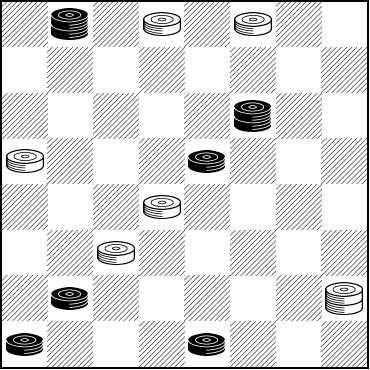
BLACK
Black to Play and Win
B:WK5,11,15,20,30,31:B2,4,8,18,K22,K32
White has blundered and Black now can win. First, can you find the win? Second, can you go back and correct White's losing move? It's actually not all that difficult. Work it out and then click on Read More to turn a long Tale into a short one, by revealing the solution.![]()
Complete Checkers, 3rd Edition

With over 200 cumulative changes from the first edition, Richard Pask's Complete Checkers (3rd edition) is now available as a free download. Just click on the Richard Pask link in the right-hand column and scroll down.
While the paperback version on Amazon has likewise been updated, there is no real need to buy a replacement book unless you wish to do so. The electronic copy will always be free of charge. It's one of Mr. Pask's many gifts to the worldwide checker playing community.
Regrettably we cannot produce an errata sheet as the changes are just too numerous and in some cases too extensive and complex.
We sincerely hope everyone enjoys and benefits from this new edition of what has already become a classic work.![]()
Uncle Ben's Porch

Tommy Wagner was pretty nervous, uncharacteristically pacing up and down and wringing his hands. "It's my big chance, Uncle Ben, but he's so good!"

Tommy Wagner
It was a sunny Florida Saturday morning, and as he had done on most Saturdays for the past eight years, Tommy Wagner was on the front porch of Uncle Ben's house. Ben, a retired checker professional, wasn't really Tommy's uncle, but all of his checker students called him 'Uncle Ben' out of respect.
Tommy, a ninth grader, was talking about the upcoming intramural match between his high school Varsity Checker team and the Junior Varsity team. Tommy had already risen to Captain of the Junior Varsity, and so in the match he would have to play a senior, Reynaldo Lopez Garcia, who was the Varsity Captain and a titled Master.

Reynaldo Lopez Garcia
"Yes, Tommy," Uncle Ben said, "he is good. There's no other way to become a Master. And we both know you haven't reached his level yet, although I'm certain you will one day."
"He's going to kill me," Tommy said. He had stopped pacing and flopped into the porch chair next to Uncle Ben.
"What's the worst thing that can happen?" Uncle Ben asked.
"I don't know ... I'll lose my game against him?" Tommy said.
"Have you lost any games before?"
"Well, sure, but ... "
"Has Reynaldo lost any games? Did I lose any games when I was playing professionally?"
"Yes, of course, but ..."
"Everyone loses games, Tommy. Even Marvin J. Mavin and the very top players. And you never know. Anything can happen. You've got to go in there and play to win. You might win, you might lose. There is no shame in losing to a Master as long as you do your best and especially if you're a good sport about it."
"I know, Uncle Ben, but I really want to show something to Coach Schann and maybe make Varsity next season."

Coach Schann
"Of course you do, and to do that, what steps should you take?"
"Um ... practice and study?"
Uncle Ben smiled, "Right on the mark. Let's pour a couple of glasses of lemonade and get into today's lesson, then, shall we? I've got an important situation set up on the checkerboard here."

Tommy smiled back. Win or lose, everything was going to be fine ... and he'd sure do his best to try to win. He turned his attention to the position that Uncle Ben had laid out.
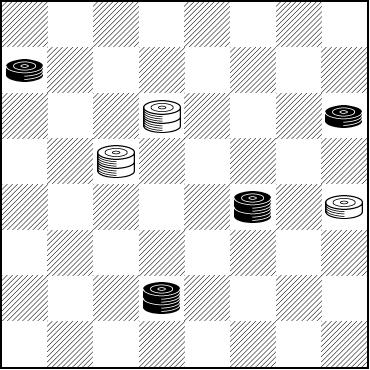
WHITE
White to Play and Draw
W:WK10,K14,20:B5,12,K19,K26
"White to play and draw?" Tommy asked.
"Yes," Uncle Ben said. "Very good. It's known as the McCulloch-Miller Draw, an important drawing technique."
Tommy thought for a while. "Got it, Uncle Ben! Let me show you."
Tommy was able to work this one out. Can you? You don't need to be a titled master to solve it. When you have your solution, click on Read More to see the solution, notes, and several additional examples of the theme.![]()
Men Against A King
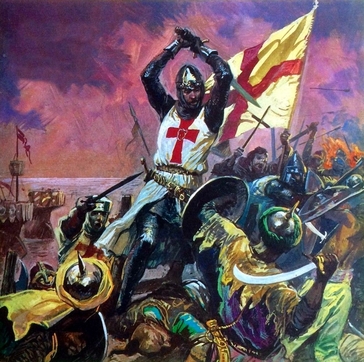
The painting above depicts the future King of England, Richard the Lionheart, surrounded by Saracens and engaged in fierce battle. It was around the year 1187 and the time of the Third Crusade. Will the men win against the King? Certainly not, as Richard would survive to become King about two years later.
Looking through the lenses of our modern era, the Crusades certainly were controversial and perhaps even mentioning them is less than politically correct (something about which we don't generally spend a lot of time worrying). But there shouldn't be any such controversy over our game of checkers, and so today we'll consider a different setting of "men against a King."

Although we haven't presented an episode in some little while, for years we've been publishing columns based on Willie Ryan's classic Tricks Traps & Shots of the Checkerboard. We're nearly at the end with only a couple of columns left to go.
Today's entry derives from Willie's A Trap With A Tale, and he of course calls it Men Against A King. Here's the run-up. It's from a game Willie played as Black against the great Sam Gonotsky, who had White. It's a really fine game and a pleasure to play over.
| 1. | 11-16 | 24-19 |
| 2. | 8-11 | 22-18 |
| 3. | 16-20 | 25-22 |
| 4. | 9-13 | 29-25 |
| 5. | 11-15 | 18x11 |
| 6. | 7x16 | 28-24 |
| 7. | 10-14 |
Certainly doesn't lose, but 5-9 and other moves likely make for an easier draw.
| 7. | ... | 22-18 |
| 8. | 6-10 | 18x9 |
| 9. | 5x14 | 25-22 |
| 10. | 1-5 | 19-15 |
| 11. | 10x28 | 22-17 |
| 12. | 13x22 | 26x10 |
| 13. | 16-19 | 23x16 |
| 14. | 12x19 | 21-17 |
Gonotsky played this clever move (21-17), instead of 27-24 to regain the piece, going a man down but gaining a strong position.
| 15. | 19-24 | 17-13 |
| 16. | 4-8 | 10-6 |
| 17. | 2x9 | 13x6 |
Black is a man up but Willie notes "it looked as if my goose were cooked, with General Gonotsky having what appeared to be an impenetrable king row."
Here's the position:
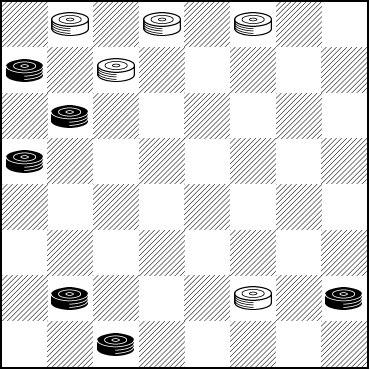
BLACK
Black to Play, What Result?
B:W6,27,30,31,32:B3,5,8,20,24,28.
Is Willie's goose cooked, or can Black save the game? This is another one that is anything but easy, but it's well worth your time and effort (although you're not going to cook Gonotsky's goose). Let it simmer for a while and then light up Read More with your mouse to see the solution.![]()
Logical Checkers 2: Freestyle Expert

Today we're pleased to announce the release of the second volume in Grandmaster Richard Pask's projected five-volume Logical Checkers series. Volume 2 is entitled Freestyle Expert.
Following on the heels of the highly successful first volume, Checkers for the Novice, the new book delves deeply into tactics, endgames and mid-game formations as well as landings and various freestyle (go-as-you-please) openings.
You can get the new book in its first electronic edition from the Richard Pask page as linked in the right column, or directly here. Through Mr. Pask's generosity the book is provided completely free of charge. The book runs to about 180 pages with over 150 diagrams and numerous illustrative games.
To demonstrate one small part of the content of this wonderful new book, here's the run-up to a sample tactics situation.
11-16 24-19 7-11 22-18 3-7 25-22; 10-14??---A 22-17 7-10 17-13 16-20---B, to the diagram.
A---Mr. Pask here quotes Richard Fortman: "This radical departure might be classified as a 'coffee-house' move, but impractical against a former world champion!”
B---2-7 29-25 16-20 25-22 14-17 21x14 10x17 19-15 12-16 28-24 17-21 24-19 8-12 15x8 4x11 19-15 7-10 15x8 White Wins---Ed., with KingsRow.
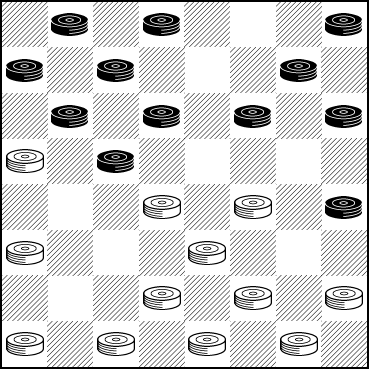
WHITE
White to Play and Win
W:W13,18,19,21,23,26,27,28,29,30,31,32:B1,2,4,5,6,8,9,10,11,12,14,20.
To see the solution, simply download the new book and turn to page 123. Our thanks as always to Mr. Pask for according us the privilege of editing and publishing his work.![]()
Uncle Ben's Porch: Tommy's JV Debut

Tommy Wagner had, with the help of Uncle Ben (a retired checkers master who wasn't really Tommy's uncle, even though it seemed like it), worked through his disappointment at not making the Varsity Checker Team when he started high school a little earlier this year. Although Tommy was a Class A player, he wasn't yet ready to complete with the experts and the titled master who made up the Varsity.

Tommy Wagner
But Tommy had easily made the Junior Varsity, and, in competition with no less than three other Class A players, had won the role of Junior Varsity Captain. Uncle Ben, who tutored Tommy most Saturday mornings, told Tommy he was very proud of him.
"But you've got your J.V. home opener coming up on Thursday night against Jacksonville Central," Uncle Ben reminded him.

It was indeed a Saturday morning and Tommy was sitting on Uncle Ben's porch, sipping from a glass of Uncle Ben's famous lemonade.
"Yes, Uncle Ben, and I hear they're pretty tough."
"Scouting reports say they have an Expert ranked player on their top board. That's going to be a challenge."
"I'm not afraid, Uncle Ben. I'll give it everything I've got, and I won't let her scare me."

Letitia Wong
"Leticia Wong is said to be a rising star." Uncle Ben didn't add that the scouting reports said the same about Tommy.
"Hopefully, she'll bring out the best in me," Tommy said.
"Very well, then, let's get to practicing."
Tommy and Uncle Ben practiced longer and harder than usual that Saturday, and Tommy worked hard during the coming week, too. But Thursday rolled around pretty quickly, and on that evening, Tommy found that Leticia was indeed a formidable opponent.

There was a big crowd in the stands. Out on the field, under the lights, the score was tied at 2-2, and Tommy and Leticia's game would decide the match. Tommy really wanted to bring in a win for the home team, and he had White in the following position.
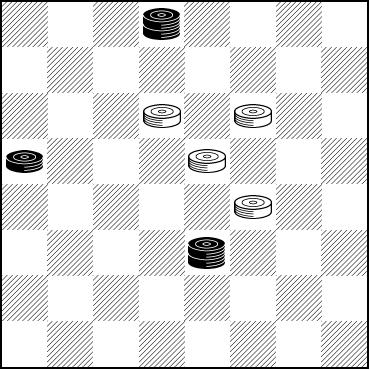
WHITE (Tommy)
White to Play, What Result?
W:B13,K2,K23:W10,11,15,19.
It was Tommy's move. He knew he could get a draw, but his team needed a win. The clock was ticking and Tommy was low on time. He had to decide quickly.
Are you a rising star like Tommy or Letitia? Your standing doesn't matter; solving the problem will be a good exercise. Give it your all--- your team is depending upon you--- and then click on Read More for the conclusion of our story, and no less than 14 examples of the theme, including the problem solution.![]()
Double Down
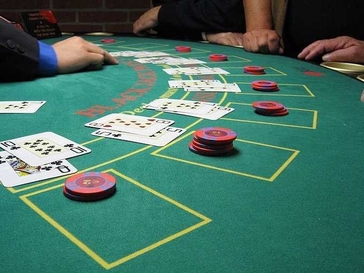
Doubling down: You're playing Blackjack at some fabulous Las Vegas casino and you think you've got two great cards. So you "double down" --- double your bet in the hopes of doubling your winnings.
Alas, it's not that simple. While under the best circumstances your chances of winning are almost 2 out of 3, most of the time you'll just double your losses. Those bright lights and free drinks are paid for by someone.
So, how does "doubling down" apply to this week's Checker Maven column? Read on.
Our Checker School columns for the last few months have featured "gem" problems by G. M. Gibson. Today we bring you the concluding entry in the G. M. Gibson problem series, and it's a practical one.
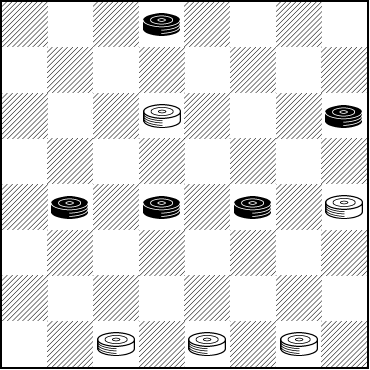
WHITE
White to Play and Win
W:W10,20,30,31,32:B2,12,17,18,19.
There are two ways to for White to win this. If this were found in a problem competition, that would be kind of a bad thing; dual (or "double") solutions are frowned upon.. But as a teaching position, doubling down (or should we say doubling up) can be instructive, and we're asking you to find both winning lines. Can you double down and do that? Can you find at least one solution? They're closely related, and if you find one, you might just find the other.
Try it (at least twice), and then--- wait for it--- double-click your mouse on Read More once to see all the answers.![]()
The Checker Maven is produced at editorial offices in Honolulu, Hawai`i, as a completely non-commercial public service from which no profit is obtained or sought. Original material is Copyright © 2004-2025 Avi Gobbler Publishing. Other material is public domain, as attributed, or licensed under Creative Commons. Information presented on this site is offered as-is, at no cost, and bears no express or implied warranty as to accuracy or usability. You agree that you use such information entirely at your own risk. No liabilities of any kind under any legal theory whatsoever are accepted. The Checker Maven is dedicated to the memory of Mr. Bob Newell, Sr.

